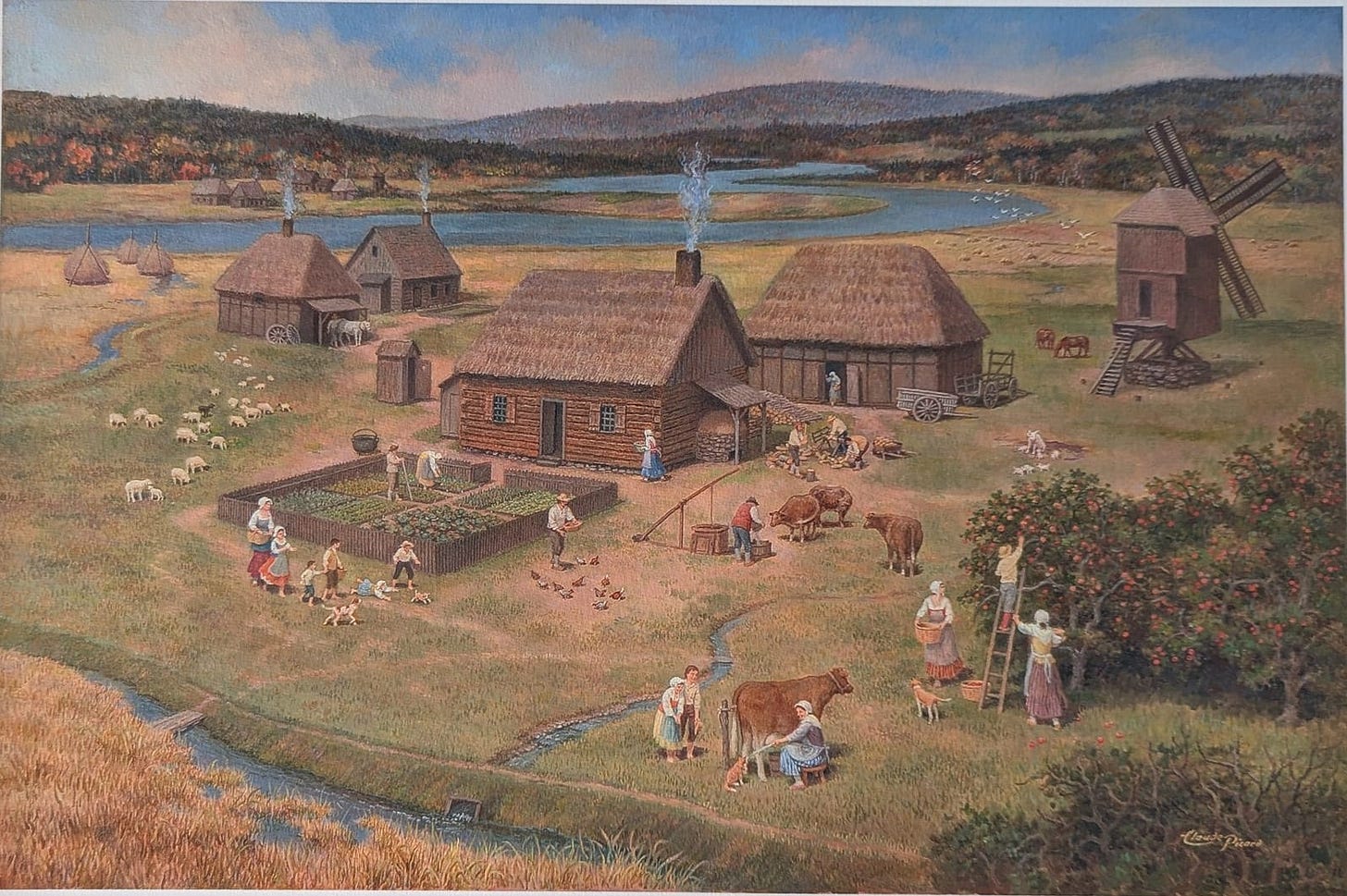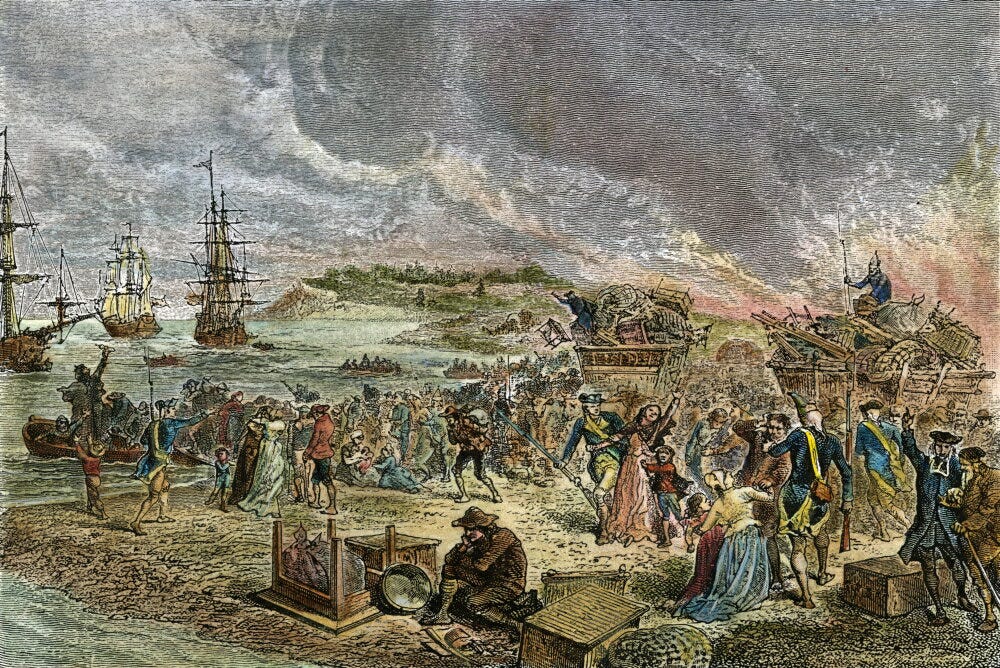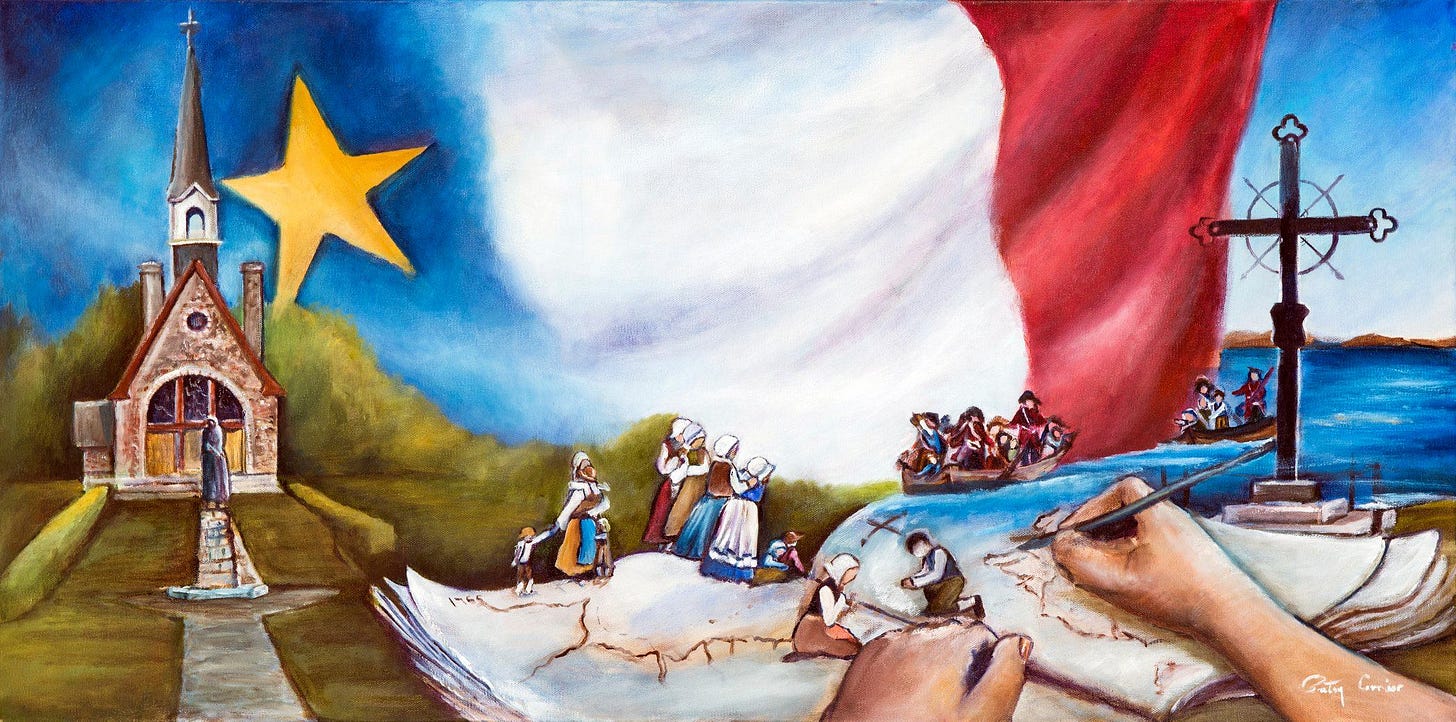*Spoiler alert: the destruction of the Acadian culture and people was unsuccessful.
“Trauma is not what happens to us. But what we hold inside in the absence of an empathetic witness.”
print of a painting by Claude Picard (Acadiann’s collection)
Imagine — you are the masters of your communal destiny. You spin, sew, garden, farm, hunt, fish, preserve, carve, build, sail, herd, play, fiddle, tell stories, chop wood, bundle hay, gossip, laugh, cry, birth babies, raise children, make love, loom cloth, buy imports from France and the English colonies, trade with your Mi’kmaq neighbors, look out on the marsh and sea and feel blessed. Despite the cranks in the village. Or maybe because of them. Soldiers and overlords are more nuisance than impediment.
19th century print, unknown artist
Imagine — you are ripped from your land, separated from your family and neighbors, watch your homes burn, your gardens trampled, your livestock slaughtered. You have only what you wear. You are frightened, too frightened to cry or rage. You may be able to hide behind your Maman’s skirts. Or speak the language of the invaders to ease the terror of your loved ones. Or set aside your cares because the times call you to lead your band of survivors through territory unfamiliar to you and among people you don’t understand. You have little to no means to provide and protect. Or you wonder why your Maman and Papa look like your Maman and Papa but don’t act like them. You land in a place where people despise you. Where you are accused of being lazy and shiftless after the evidence of your hard work was destroyed by the agents of the people who now despise you.
How do you NOT experience that as what we’d now call trauma? The trauma of ethnic cleansing. Some would say genocide.
The Big Upheaval — what a minimizing euphemism THAT word is for the events the ancestors endured from 1755 to 1763.
But, since it happened about 275 years ago, does it still matter? Has enough time passed to heal wounds and forget about it? If you don’t talk about it, does it disappear?
Seems to matter to other humans who collectively endured like traumas — 400 years ago (enslavement, land grabs from indigenous peoples), 160 years ago (U.S. Civil War), 80 to 100 years ago (World Wars, Holocaust, dropped nuclear bombs on Japan), or in the now (Ukraine-Russia, Israeli-Palestinian wars). The answers, when I think about how people from these collectives talk about the ongoing harms they endure, would be “yes, it matters. And, no, not enough time has passed to forget it.”
Then what happened to disappear awareness of the harms heaped on Acadians?
GKillick on YouTube
I want to understand the consequences of ethnic cleansing of our Acadian ancestors without blaming or shaming. I think of the metaphor of someone slamming a car door on my finger. I’d try not to blame or shame them for doing that, but my finger would still hurt and need healing once the door was opened.
The compelling drive to understand now comes from the surprise sorrow I felt in response to cousin Nicole Gallant Nunes’ latest project: to enumerate by name each of the Acadians who died due to the Grand Dérangement.
Nicole: My big project this summer was to highlight all the key facts about the 765 Filles du Roi in Quebec and it was really a test for this much bigger project that I've had in mind for a while: to list our Acadian ancestors and cousins who were lost.
Well lost isn't really the right word is it?.. since it almost sounds unintentional or accidental...but they were murdered. It was genocide.
We often stumble across their names while researching our family trees and perhaps some of us pause for a moment to reflect and make note of them. Maybe we dig deeper into their lives to learn about their specific story but it's really just us descendants and cousins who do that. The majority of the rest of the world has no idea that this brutality existed for our people. I know this list will end up being thousands of names so it will need to be released in parts but it's a start on a long road to honor them all. I've always felt like I had to do something to bring light into this darkest part of our history. It's that pull that I can't quite explain.
I know there have been some descendants, like myself, who have made these memorial lists for their own families, which is amazing, but I found the information is all spread out. At first it surprised me that no one had compiled all of these names before, but then realization hit of how daunting of a task it is, especially to do it alone, but it would be incredibly powerful to see all of these names, dates and locations in one place. A virtual memorial to those taken too soon. I think the real impact will come when everyone sees the ages. Children.....babies.
It's haunting and heartbreaking and maybe that's part of the reason why this isn't talked about more, but it is SO important. They meant something, everything, to their loved ones who carried their spirits with them through the generations, and they mean something to us now. To be named and spoken of is to live on. If we can honor them in this small way, then we must.
Tell me you aren’t now shedding a few tears yourself.
Nicole asked our Facebook collective to send in the names of people we knew about in our individual family lines — to make sure, as best as possible, no one is forgotten.
Forgotten. How is it that THAT word reached straight into my heart?
Deportation by Acadian artist Patsy Cormier
By sending out the first two lost names I could recall, I left the realm of historical reports. These were no longer among the vague images of “thousands died,” but the once living, breathing, loving, funny, irritable members of my family.
They were real people resurrected in my historical fiction-in-progress: Marie Theotiste Vigneault, sister of my ancestor, at age 11 dying alone and apart from her family on November 13, 1755 in Quebec City. Her maman — Agnes-Anne Poirier — dying probably in Massachusetts sometime between 1758 and 1763. But in which town and how — unknown.
Before the deportation, they lived in Beaubassin. On October 13, 1755, 269 years ago today, the residents of this isthmus were deported on seven ships that left Chignecto for exile to the southern colonies.
I knew these as facts. But I hadn’t felt them so personally until Nicole shifted the lens from those who survived to those who perished. I grieved them. I wondered whether I was becoming a little nutty.
But Nicole also found herself shedding tears as she added names to the list.
So if I’m nutty, at least I’m not alone. There is solace in that.
Then it hit me: We are the empathetic witnesses for our Acadians ancestors, are we not?
Resources









Really great piece of writing, Ann. We know all too well the story of indigenous genocide, but we still tend to think of North America for white people as the 'New World" without all the scars of the old. of course North American history is long, and filled with land grabs and ethnic cleansings done by people of European heritage to other Europeans, too. I have often thought how the victims of the deportation had no vocabulary for what was happening to them. And life was hard in the 18th century, in France and the Americas so there wasn't enough empathy to go around for survivors.
This is really heart wrenching Ann. Thank you for doing all the research on it and for sharing this with us. It hits a modern chord in me with all that is going on in the world right now. Tragic. Man's inhumanity to man.